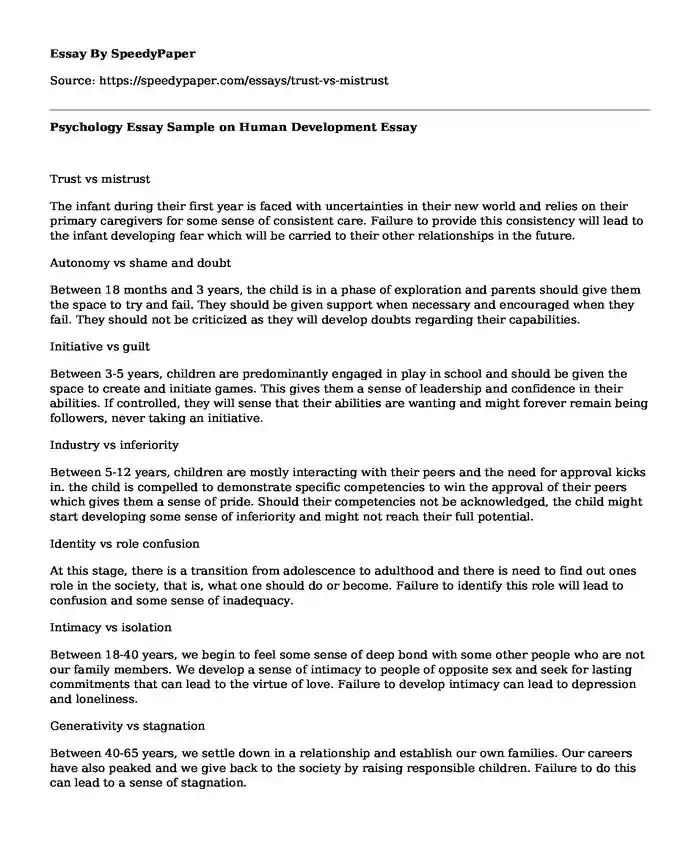
| Type of paper: | Essay |
| Categories: | Psychology Human Human development |
| Pages: | 3 |
| Wordcount: | 675 words |
Trust vs mistrust
The infant during their first year is faced with uncertainties in their new world and relies on their primary caregivers for some sense of consistent care. Failure to provide this consistency will lead to the infant developing fear which will be carried to their other relationships in the future.
Autonomy vs shame and doubt
Between 18 months and 3 years, the child is in a phase of exploration and parents should give them the space to try and fail. They should be given support when necessary and encouraged when they fail. They should not be criticized as they will develop doubts regarding their capabilities.
Initiative vs guilt
Between 3-5 years, children are predominantly engaged in play in school and should be given the space to create and initiate games. This gives them a sense of leadership and confidence in their abilities. If controlled, they will sense that their abilities are wanting and might forever remain being followers, never taking an initiative.
Industry vs inferiority
Between 5-12 years, children are mostly interacting with their peers and the need for approval kicks in. the child is compelled to demonstrate specific competencies to win the approval of their peers which gives them a sense of pride. Should their competencies not be acknowledged, the child might start developing some sense of inferiority and might not reach their full potential.
Identity vs role confusion
At this stage, there is a transition from adolescence to adulthood and there is need to find out ones role in the society, that is, what one should do or become. Failure to identify this role will lead to confusion and some sense of inadequacy.
Intimacy vs isolation
Between 18-40 years, we begin to feel some sense of deep bond with some other people who are not our family members. We develop a sense of intimacy to people of opposite sex and seek for lasting commitments that can lead to the virtue of love. Failure to develop intimacy can lead to depression and loneliness.
Generativity vs stagnation
Between 40-65 years, we settle down in a relationship and establish our own families. Our careers have also peaked and we give back to the society by raising responsible children. Failure to do this can lead to a sense of stagnation.
Ego integrity vs despair
Above 65 years old, we reflect back on our lives to see if we made a positive impact as our productivity at this stage is waning. If we feel that our score card is wanting, we feel a sense of despair which can lead to depression and hopelessness. Should we feel that our score card is impressive, we develop the virtue of wisdom.
Question 2
By giving them consistent, predictable and reliable care
Question 3
By encouraging them to explore the limits of their capabilities through the cultivation of an environment that tolerates failure.
Question 4
At some point in the movie, Daniel Craig says that happiness cannot be predicted. This struck me as odd and kept niggling at the back of my mind. It made me learn that I might as well enjoy what I have now rather than pursue what I think will bring me happiness tomorrow; after all tomorrow is never assured.
Question 5
Sigmund Freud
Question 6
Alfred Adler
Question 7
The id, the superego and the ego.The id is concerned with instantly gratifying the basic human needs and wants and operates unconsciously. If per chance you happen to pass by someone eating a burger, the id would want to grab the burger from that person, its only concern being that it wants to have the burger regardless of who owns it.
The superego is concerned with what the society terms as right or wrong. As the child grows the society instills in them a sense of what is right or wrong. The superego is what leads to feelings of guilt or remorse after committing an act that contravenes societal norms.
The ego is the rational part of our personality and balances the demands of the id and the superego in a practical context.
Cite this page
Psychology Essay Sample on Human Development. (2019, Nov 20). Retrieved from https://speedypaper.com/essays/trust-vs-mistrust
Request Removal
If you are the original author of this essay and no longer wish to have it published on the SpeedyPaper website, please click below to request its removal:
- Free Essay on the Book Guns, Germs, and Steel by Jared Diamond
- Comparative Political Economy, Free Essay
- Check the Brief Overview of Genetic Algorithm in a Free Essay
- Free Essay: Chesapeake IT Consultants, The Introduction of the IT System, And Hiring New Consultants
- Essay Sample on Holistic Health Teaching for Patients with Diabetes
- Poetry Analysis Essay on "America" by Claude Mckay and Mikhail Dunya's "I Was in a Hurry"
- Essay Sample on Making Decisions: Personal Reflection
Popular categories




